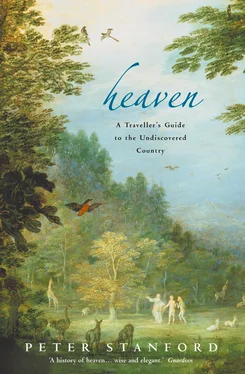There is then a link between extolling the virtue of a single God, responsible for everything on this earth, and belief in an afterlife. If you centre your hopes, prayers and expectations on just one God, you inevitably concentrate on the ‘personality’ of that God, so much more than you would if you have tens or hundreds of gods to choose from, and, as a consequence, you nurture a hope of making contact with that God face-to-face.
This narrow focus takes its tolls on imaginations, or at least channels them in a particular direction, and often makes for a palpable sense that God must be near at hand. This in its turn leads to an exaggerated interest in the place where God lives and to where the faithful might one day travel. But the chain of connections between monotheism and heaven goes deeper. The omnipotent God upheld by monotheistic faiths embodies good and evil in a single source, as opposed to parcelling both out across a whole range of spirits, some of them two-faced. Christianity may itself have diluted this by invoking the devil in practice at least, if not in theory, as an equal and opposing force to God, but that should not distract from the fact that the creation of such a powerful, unified divine principle inevitably brings with it a sense of humankind’s smallness and impotence before their God, and also, therefore, a turning away from each person’s individual resources (as preached in Eastern faiths) towards a greater public search for oneness with the divine which necessitates a public arena – i.e. heaven – for fulfilment.
The tension between the two radically different emphases – on this life and on the next life – is, in effect, both the argument for and against heaven. Both have their strengths. The first places great and potentially empowering emphasis on each person to cultivate an internalising spirituality. For some this burden is too much of a challenge. Putting it all off until after death with the promise of a heaven – especially one where, as in the Christian New Testament, God will roll out the red carpet for the workers who only spend the last hour of the day in His vineyard as readily as He will for those who have toiled since sun-up – is much more palatable. Death-bed repentance, in theory at least, allows for brinkmanship – a life of wonderful hedonism followed by a last minute change of heart, half an hour of piety and remorse and then a heavenly hereafter.
For some, the ‘jam tomorrow’ approach of monotheism belongs in the nursery, but to its adherents, in more mature vein, it offers consolation in the face of the inevitability and finality of death. It also requires a moral framework which can be carefully calibrated (often by clerical hierarchies) as a step-by-step guide to achieving a good afterlife. Immanuel Kant, the eighteenth-century German philosopher and religious sceptic, once remarked that without heaven no system that sought to teach, preach or impart morality could survive.
How to decide between the Eastern and the Western approach? Conventional wisdom – shared for once by scientists and clerics – is that there can be no verifiable communication with the other side as a way of assessing which has most merit. Central to Eastern ideas of rebirth is forgetting all that has gone before. There have always been, however, unconventional individuals able to service those who are too restless to wait and see. The Victorians went to spiritualists and mediums; we, in our turn, devour the literature of near-death experiences to satisfy our hankering to know if there is anything more to come. The American bestseller, Hello from Heaven (edited by Bill and Judy Guggenheim), was a collection of 353 accounts of communications from beyond the grave.
To accept absolute oblivion after death, a brain that stops functioning and a body that rots, would be to accept the polar opposite of heaven. It is increasingly popular as an option. There is even some scriptural foundation for such a stance: in the Old Testament, Job suffers endless adversity as part of a debate between Yahweh and Satan on the nature of human goodness. When he survives the ordeal, his reward is to have ‘twice as much as he had before’ in this life. There is no suggestion that there is any other.
Most of us, however, find the idea that death is the end unappealing, unthinkable or untenable – or a combination of all three. We cling fearfully and in hope to the notion, common in monotheistic religions, of the soul, that invisible but integral part of us that is above the messy business of physical death. Yet despite its enduring popularity, a heavenly hereafter for the souls of the faithful departed has been officially declared by the mainstream churches as being beyond our imagination.
The fact that it is unimaginable but nonetheless officially there is, however, just another aspect of heaven’s appeal. We can sign up for it without having to think too hard about what that means. It’s like taking out an insurance policy without ever having to study the small print.
When in 1999 Pope John Paul II pronounced that heaven was a ‘blessed community’ which was ‘neither abstraction nor physical place’, he was following the recent tendency to underplay what could be regarded as the Churches’ trump card. Clerics are curiously nervous of mentioning heaven, despite its potential as a crowd puller, especially with the elderly. When a senior English archbishop gave an address at a Roman synod the same year, in which he blandly mentioned heaven in passing, I wrote to him to ask if we might meet so he could develop what seemed an intriguing theme. He wrote back by return saying that he was busy for the foreseeable future and couldn’t really add to the words he had offered already. Yet he had said nothing.
One might almost conclude that the Western churches are, behind the scenes, realising that their Buddhist and Hindu confrères in the East have hit upon something in their lack of interest in the afterlife and so are gently repositioning their doctrines as a result. But that would be to ignore the lesson of history. For the Pope’s almost embarrassed talk of heaven is part of a long Christian tradition. There are mentions of heaven aplenty in the New Testament. Some Christian fundamentalists believe that the Book of Revelation goes so far as to provide a street plan. Saint Augustine, arguably the most influential writer and thinker in Christian history, would, however, be pleased to hear the modern-day Vatican trying to quell speculation on the hereafter. In the fifth century he insisted that heaven was ‘ineffable’ – beyond words. It was indeed Augustine who established the term ineffabilis in theology as a way of summing up one of his favourite maxims – that it is easier to say what God is not than to say what He is.
Augustine’s word, rather like John Paul II’s, has not always been law in this, nor in other matters. Sketching out their own imaginary topography of Christian heaven has been a long line of theologians, mystics, artists, writers and the builders of the great Gothic cathedrals, whose spires reached to the skies. Usually starting with Revelation, which pictured paradise as a cleaned-up version of Jerusalem without its Temple, these seers have constructed the pearly gates and enlisted harps (first heard in the New Testament Apocrypha – the early Church texts considered too unorthodox to make it into the Holy Bible).
Outside the cloister, Dante mapped out his Paradiso of the skies in the fourteenth century with Renaissance precision and with every bit the same authority as he had invested in his Inferno in the bowels of the earth, though by a quirk of human nature it is the latter that has continued to fascinate us more. The same, incidentally, is true of John Milton in the seventeenth century. His Paradise Lost has been vastly influential in shaping modern thinking on the Devil and his hellish lair, but those sections of the text which describe heaven are overlooked. Perhaps it is a desire amongst readers not to appear presumptuous as to their final destination that has traditionally allowed hell to eclipse heaven in terms of the popular imagination. Or perhaps it is just the dominance of fear in our emotional range. More practically, it may be art for once imitating the attitudes of those in power. The post-Reformation churches of Milton’s time were much keener on frightening people in to the pews with talk of hell than in enticing them with pictures of heaven.
Читать дальше












